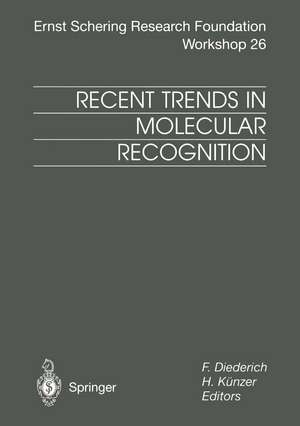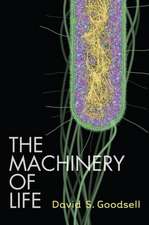Recent Trends in Molecular Recognition: Ernst Schering Foundation Symposium Proceedings, cartea 26
Editat de F. Diederich, H. Künzeren Limba Engleză Paperback – 9 ian 2013
Din seria Ernst Schering Foundation Symposium Proceedings
- 5%
 Preț: 717.37 lei
Preț: 717.37 lei - 5%
 Preț: 706.77 lei
Preț: 706.77 lei - 5%
 Preț: 706.77 lei
Preț: 706.77 lei -
 Preț: 381.91 lei
Preț: 381.91 lei - 5%
 Preț: 360.51 lei
Preț: 360.51 lei - 5%
 Preț: 664.41 lei
Preț: 664.41 lei - 5%
 Preț: 1091.50 lei
Preț: 1091.50 lei - 5%
 Preț: 664.41 lei
Preț: 664.41 lei - 5%
 Preț: 367.84 lei
Preț: 367.84 lei - 5%
 Preț: 362.16 lei
Preț: 362.16 lei - 5%
 Preț: 714.27 lei
Preț: 714.27 lei - 5%
 Preț: 364.33 lei
Preț: 364.33 lei - 5%
 Preț: 714.06 lei
Preț: 714.06 lei - 15%
 Preț: 634.49 lei
Preț: 634.49 lei -
 Preț: 382.75 lei
Preț: 382.75 lei - 5%
 Preț: 364.89 lei
Preț: 364.89 lei -
 Preț: 384.31 lei
Preț: 384.31 lei - 5%
 Preț: 363.44 lei
Preț: 363.44 lei - 5%
 Preț: 363.60 lei
Preț: 363.60 lei - 5%
 Preț: 366.56 lei
Preț: 366.56 lei - 5%
 Preț: 365.25 lei
Preț: 365.25 lei - 15%
 Preț: 630.09 lei
Preț: 630.09 lei - 5%
 Preț: 370.21 lei
Preț: 370.21 lei - 5%
 Preț: 361.60 lei
Preț: 361.60 lei - 5%
 Preț: 1088.96 lei
Preț: 1088.96 lei - 5%
 Preț: 722.33 lei
Preț: 722.33 lei - 15%
 Preț: 638.43 lei
Preț: 638.43 lei - 5%
 Preț: 363.44 lei
Preț: 363.44 lei - 5%
 Preț: 1408.97 lei
Preț: 1408.97 lei - 15%
 Preț: 640.06 lei
Preț: 640.06 lei - 18%
 Preț: 1386.48 lei
Preț: 1386.48 lei - 5%
 Preț: 714.63 lei
Preț: 714.63 lei - 5%
 Preț: 1096.62 lei
Preț: 1096.62 lei - 5%
 Preț: 1092.58 lei
Preț: 1092.58 lei - 5%
 Preț: 367.64 lei
Preț: 367.64 lei
Preț: 383.93 lei
Nou
Puncte Express: 576
Preț estimativ în valută:
73.46€ • 76.52$ • 61.24£
73.46€ • 76.52$ • 61.24£
Carte tipărită la comandă
Livrare economică 29 martie-12 aprilie
Preluare comenzi: 021 569.72.76
Specificații
ISBN-13: 9783662035764
ISBN-10: 3662035766
Pagini: 264
Ilustrații: XIII, 246 p. 55 illus.
Greutate: 0.32 kg
Ediția:Softcover reprint of the original 1st ed. 1998
Editura: Springer Berlin, Heidelberg
Colecția Springer
Seria Ernst Schering Foundation Symposium Proceedings
Locul publicării:Berlin, Heidelberg, Germany
ISBN-10: 3662035766
Pagini: 264
Ilustrații: XIII, 246 p. 55 illus.
Greutate: 0.32 kg
Ediția:Softcover reprint of the original 1st ed. 1998
Editura: Springer Berlin, Heidelberg
Colecția Springer
Seria Ernst Schering Foundation Symposium Proceedings
Locul publicării:Berlin, Heidelberg, Germany
Public țintă
ResearchCuprins
1 Designing Transition Metal Complexes for Molecular Recognition in Synthetic Transformations.- 2 REDOR NMR of Biological Solids: From Protein Binding Sites to Bacterial Cell Walls.- 3 Molecular and Dendritic Receptors for Small Biomolecules.- 4 Molecular Recognition of DNA by Ecteinascidin 743.- 5 New Tools for Drug Design Based on Protein Ligand Recognition Principles.- 6 Sequence-Specific Recognition of DNA and Control of Gene Expression by Oligonucleotide-Intercalator Conjugates.- 7 Combinatorial Nucleic Acid Libraries: The New World of Aptamers and Ribozymes.- 8 Sequence Specific Recognition of Double Stranded DNA by Peptide Nucleic Acid.- 9 Solid Phase Libraries of Glycopeptide Templates in the Study of Complex Oligosaccharide-Receptor Interactions.- 10 The Molecular Recognition of Saccharides and Glycoprotein-Inspired Materials.- 11 Self-Organized Autocatalytic Chemical Networks and Molecular Ecosystems: Do They Provide the Experimental Tools for Modeling the Transition from Inanimate to Animate Chemistry?.- Previous Volumes Published in this Series.
Textul de pe ultima copertă
Reasoning in terms of molecular recognition may be traced back to Emil Fischer, who practiced the art of chemistry at Humboldt University in Prussian Berlin a century ago. Today, it is clearly recognized that molecular recognition impacts and determines all life processes. It has become a key research field in both chemistry and biology and the emerging interface of what now is being called "chemical biology". The technological advances derived from this knowledge are particularly important, diverse, and directly evident in the pharmaceutical industry. Under the auspices of the Ernst Schering Research Foundation, a workshop held in Berlin in February 1998 addressed novel basic developments of potential relevance to drug research efforts. A balance of timely research topics in molecular recognition is presented in the lectures delivered by a multidisciplinary international panel of renowned scholars and documented in this volume.








